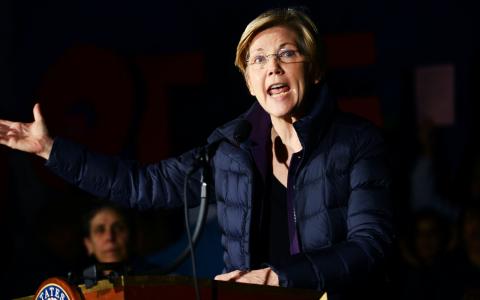
(Reuters) A leading economist who vouched for Democratic presidential candidate Elizabeth Warren’s healthcare reform plan told Reuters on Thursday he doubts its staggering cost can be fully covered alongside her other government programs.
Mark Zandi, chief economist at Moody’s Analytics, also voiced skepticism that the wealth tax provision in Warren’s plan - a key funding mechanism - will produce predicted levels of revenue because those targeted by the tax will seek to dodge it.
“It’s not hard to believe billionaires are going to use every resource to avoid paying the tax,” Zandi said.
Taken in isolation, Zandi said, Warren would be able to find the revenue necessary to cover the massive cost of reform. “I stand by the funding estimates, as a standalone plan,” Zandi said.
Even if the wealth tax projections fall short, Zandi believes Warren may still be able to make up the difference through other taxes in her plan, including those on corporations and employers.
Yet Zandi warned the wealth tax revenue predictions may not hold up if she also simultaneously tries to fund her proposed expansion of government programs, including free child-care and student debt forgiveness.
“I’m skeptical the wealth tax will generate the same amount of revenue after considering all her plans together,” he said.
Warren, a U.S. senator from Massachusetts, estimates her healthcare overhaul will cost an additional $20.5 trillion in federal spending over 10 years without the need to raise middle-class taxes, a claim questioned by some of her rivals in the 2020 White House race.
Zandi said despite signing a highly touted letter last week backing the calculations for Warren’s Medicare for All plan, he does not support shifting Americans off the private health insurance they have in favor of a single-payer, government-run regime.
“I am not a fan of Medicare for All,” said Zandi, who is not affiliated with any Democratic presidential campaign and does not speak for the Warren campaign. “We have 160 million people who have private insurance and are pretty happy with what they have. Why change that?”
A Warren campaign official, speaking on the condition of anonymity, said other leading economists who did not sign last week’s letter have defended the wealth tax’s revenue estimates and its enforcement mechanisms.
The official said the wealth tax will be straightforward to administer because it applies to only 75,000 ultra-wealthy families who typically already keep careful track of their wealth.
The wealth tax revenue estimates factored in significant discounts for evasion, and the plan includes measures to sharply strengthen IRS enforcement, the official said.
At a campaign stop in North Carolina on Thursday, Warren was asked to respond to criticism that her Medicare for All plan is a “pipe dream” and “fairy dust.”
Warren replied: “You don’t get what you don’t fight for.”
Zandi said he prefers the less far-reaching healthcare plan being pushed by Pete Buttigieg, the mayor of South Bend, Indiana, and one of Warren’s chief competitors for the Democratic presidential nomination.
Buttigieg’s plan is similar to other moderate Democrats’ healthcare proposals, because it does not eliminate private insurance. Instead, it seeks to set up competition between a public, government-run option and private plans to lower costs and potentially move Americans onto a Medicare for All system over time.
WEALTH TAX
A key part of Warren’s revenue calculations to pay for her healthcare overhaul comes from a new tax on the wealthiest 1% of U.S. individuals, or a “wealth tax”.
Warren initially proposed a tax that would impose a 2% federal tax on every dollar of a person’s net worth over $50 million and an additional 1% tax on every dollar in net worth over $1 billion. She upped the “billionaire’ s surcharge” to a total of 6% when she released her plan to pay for Medicare for All.
Zandi, and the other economists who signed the letter, estimated the tax would generate an extra $3 trillion in revenue between 2020 and 2029, part of $20.5 trillion they say can be generated overall through additional taxes, but without raising middle-class taxes.
Zandi said a wealth tax would be hard for the government to enforce. “There will be more avoidance and IRS enforcement may not be up to the task,” he said.
Wealth taxes have been tried in many European countries, with limited success. Many affluent people moved assets abroad and the tax resulted in far less revenues than predicted.
Betsey Stevenson, an economics professor at the University of Michigan and another of the signatories on the Warren funding letter, said Warren’s plan shows it is possible to pay for Medicare for All without raising middle class taxes.
“The point of the letter was to show whether it is possible, rather than if it is desirable,” Stevenson said.



